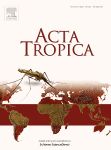

 Principal |
Mapa do Site |
Adicione aos Favoritos |
Indique o site |
Contato
Principal |
Mapa do Site |
Adicione aos Favoritos |
Indique o site |
Contato

|

 Principal |
Mapa do Site |
Adicione aos Favoritos |
Indique o site |
Contato
Principal |
Mapa do Site |
Adicione aos Favoritos |
Indique o site |
Contato
|
| A Farmabrasilis | O que Fazemos | Pesquisa e Desenvolvimento | Publicações e Monografias | Ensaios Clinicos | Notícias | Contato |
 |

05/05/2013

Acta tropica: Improvement in clinical signs and cellular immunity of dogs with visceral leishmaniasis using the immunomodulator P-MAPA
Abstract
This study investigated the immunotherapeutic potential of the protein aggregate magnesium-ammonium phospholinoleate-palmitoleate anhydride immuno-modulator (P-MAPA) on canine visceral leishmaniasis.
Twenty mongrel dogs presenting clinical symptoms compatible with leishmaniasis and diagnosis confirmed by the detection of anti-Leishmania antibodies were studied.
Ten dogs received 15 doses of the immunomodulator (2.0 mg/kg) intramuscularly, and 10 received saline as a placebo. Skin and peripheral blood samples were collected following administration of the immunomodulator.
The groups were followed to observe for clinical signals of remission; parasite load in the skin biopsies using real-time PCR, the cytokines IL-2, IL-10 and IFN-γ in the supernatant of peripheral blood mononuclear cells stimulated in vitro with either total promastigote antigen or phytohemagglutinin measured by capture ELISA, and changes in CD4+ and CD8+ T cell subpopulations evaluated by flow cytometry.
Comparison between the groups showed that treatment with the immunomodulator promoted improvement in clinical signs and a significant reduction in parasite load in the skin. In peripheral blood mononuclear cell cultures, supernatants showed a decrease in IL-10 levels and an increase in IL-2 and IFN-γ.
An increase in CD8+ T cells was observed in peripheral blood. In addition, the in vitro leishmanicidal action of P-MAPA was investigated using 3-(4,5-dimethylthiazol-2-yl)-2,5-diphenyltetrazolium bromide (MTT) and no leishmanicidal activity was detected.
Conclusions: These findings suggest that P-MAPA has potential as an immunotherapeutic drug in canine visceral leishmaniasis, since it assists in reestablishing partial immunocompetence of infected dogs.
Link ( PubMed): http://www.ncbi.nlm.nih.gov/pubmed/?term=P-MAPA%2B+ACTA+TROPICA


Política de Privacidade | Termo de Uso |
copyright @2006 - farmabrasilis - todos os direitos reservados
|